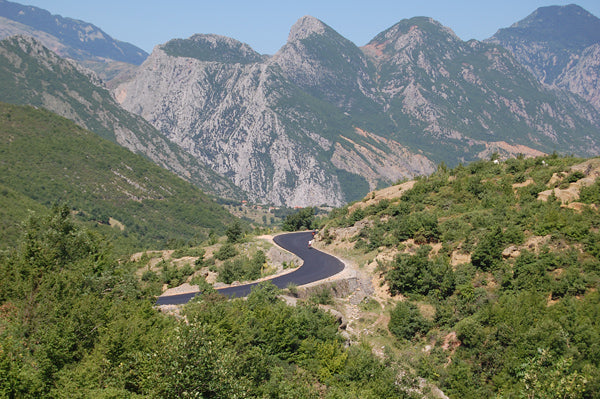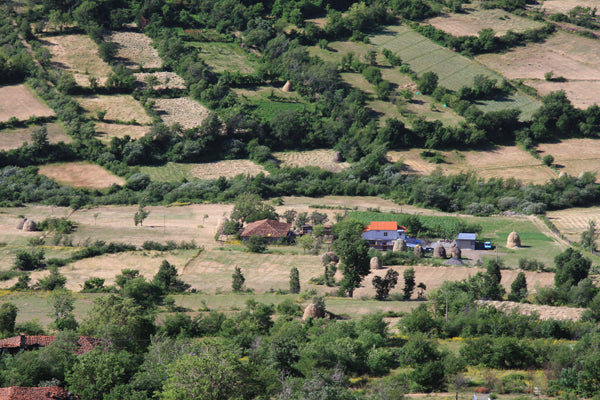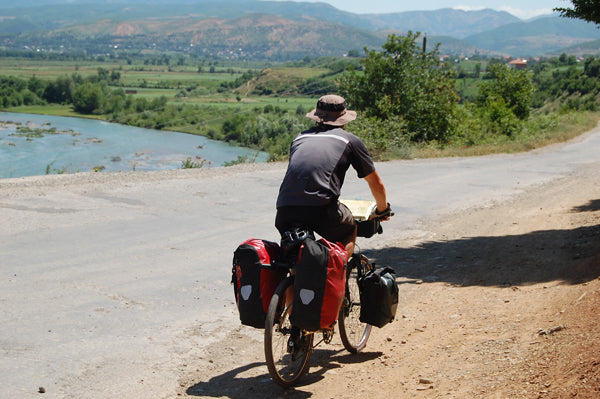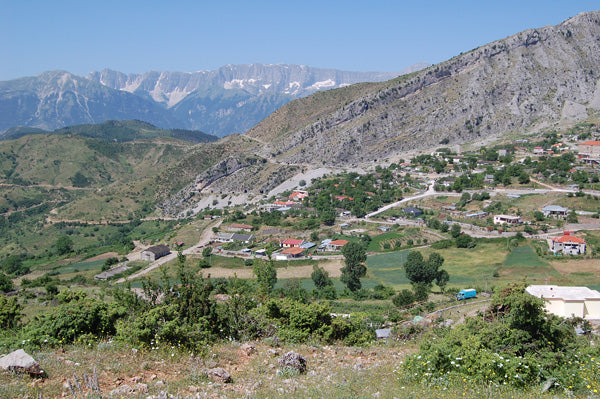Your Cart is Empty
Gear
FAQ
Blog
Albania for Beginners
01 May 2010
by Tim Mulliner
In the summer of 2009, our route from Greece to Germany crossed the small country of Albania. It glared from the map with uncertainty - neither Tina nor I could claim encyclopaedic knowledge of the place. We knew it to be the poor cousin of Europe and that when the iron curtain was drawn, Albania was further isolated within the Eastern Bloc by Enver Hoxha - Albania's resident dictator for four long decades. He died in 1985 and since then Albania has slowly opened up to the rest of the world.
Tina and I snuck in early one May morning via a small border post approximately 100km north-west of the Greek city of Ioanina. We arrived at 6.30. I like mornings and Tina hates the heat. We'd had our share of both in Greece. Our early start was fruitless though as the border was deserted. While we waited a bus arrived. Three locals were ejected and soon delivered us a crash course in Albanian. Then two ageing Mercedes Benz came to a screeching halt. Their wheels sunk below the rims. It was unclear whether this was a result of Albania's notoriously bad roads, or the weight of cheap Greek goods lashed to the rooves and spilling from within.
The border opened at 8am and our lesson finished abruptly. Stamped out of Greece, we rode a short distance around a chicane before coming to a halt at the opposing immigration building. With only a slightly more dishevelled appearance than his Greek counterpart, the Albanian official slowly punched our details into a computer that may have been communism's answer to the Commodore VIC 20. Superiors were questioned, the nod given and an entry stamp expertly squeezed onto a page already dominated by a couple for Romania and another two for Bulgaria. Team players these communists.

The road was initially smooth and flat - dissecting green fields dotted with concrete bunkers. A legacy of Hoxha's paranoia, an extraordinary 700,000 recessed mounds of cement and iron populate the countryside. Together with the ageing Mercs, they were to provide us with constant company and free emergency accommodation during our stay. Reputably tank-proof, they are destined to remain a defining part of the landscape for centuries to come. The road forked at a small collection of crumbling buildings. Saddled donkeys idled outside the small rickety shops while their owners and equally inquisitive sheep, cows and goats watched us with interest. We tested our recently acquired language skills. "Tungjatjeta". Several wrinkled men approached and enquired of our destination. They gestured along the obvious main road. We pointed at the potholed tarmac leading towards the Grammos mountains.

The road was quiet apart from the creaking of our bikes and knees. The solitude occasionally broken by a Merc inching past while dodging the potholes. Otherwise the gentle sounds of shepherds and their flocks reverberated through the valley. Even the dogs seemed oblivious to the fact that cyclists are fair game and great fun to chase.

The dark green countryside was broken only by the white capped mountains as we bagged a 1000 metre climb and descended to the rundown town of Leskovik. While Tina shopped for food, I received another lesson in Albanian - this time from a small boy. By the time we left I could rattle off most parts of my bike in Albanian.

Morning merged into afternoon and we relished the relative coolness of altitude. The mountains stood crisply to one side while the hills ahead rolled smoothly and gently. The road did not. Instead it climbed steeply in fits and starts along what was assuredly the line of greatest resistance. Eventually we crested a pass and a 25 km decent to Korςë beckoned. We dossed the night with Mike, an American stationed there with the Peace Corps. Our bicycles just fitted into the lounge of his tiny communistic apartment. Road grime spiralled down the plughole while the shower periodically electrified us. Our filthy Double Happys and Tom Thumbs were given a workout in the ancient washing machine. We dined at Biere Korςë, a local brewery conveniently situated across the road and crashed heavily on Mike's kitchen floor once we'd had our fill.

The road north was new and fast - but full of traffic and erratic drivers. Roughly the size of Otago, Albania would have been a cyclist's paradise 20 years ago with fewer than 2000 registered cars. But times have changed and we learnt to stick to the mountains. Arriving on the shores of Lake Ohrid, we lunched while old men paced the boulevard and kids lapped up summer. After a siesta we snuck into Macedonia and along the eastern shore of Lake Ohrid before re entering Albania the next day.

The road was a mix of the good, the bad and the un-rideable as we battled up the valley towards Bulqizë. The hills closed in on us with every turn. Farmers loaded hay into obelisk structures with pitchforks, raising their hats and waving. A fargo (small Albanian bus) skidded to a crawl beside us. The passengers stared wide-eyed as the driver screamed at us. "Hello, hello. Youwill drink with me? I want to speak English. There is a bar around the corner."
Half an hour later we caught up with the now abandoned passengers waiting for the next fargo. Our new friend Shjendi summoned us to a recently built tree hut of dubious structural integrity. We took a seat and sculled Albanian beer. Shjendi had spent seven years in England as an illegal 'refugee'. He had attempted the trip an astonishing seventeen times before finally succeeding. Upon returning home he met his seven year old daughter for the first time. Even on criminally low wages he'd managed to set his family up for life, building a house and purchasing his own fargo. It's a common story in Albania although most travel to nearby Italy. We often spotted the Italian tricolore flying atop newly built houses, men wearing the strip of their favoured Italian football club, and were greeted by people yelling "buon giorno". Back at Shjendi's house, we surveyed his small farm. A field of maize, a generous vegetable garden, two cows, some chooks and several rows of fruit trees fed the family, with any surplus sold or traded. Tina and I were treated like royalty, presented with a constant stream of coffee, beer and raki as the afternoon slipped away. Any thoughts of returning to the road were banished when Shjendi's wife Naferie killed a chicken and a feast was prepared in our honour.

We shovelled down a greasy breakfast of cheese and bread the next morning. Raki was politely refused, our heads still weary from the previous night. Treacle-like coffee got us going although its effect was short lived. Tired and weary, we struggled up the valley, over a pass and promptly collapsed at the next town. The rest of the day was spent recovering within the confines of a hotel.

Our final day in Albania was a long 150km haul to neighbouring Montenegro. That evening we paused on descent to the seaside town of Bar. It wasn't an especially attractive city but light wispy clouds and a setting sun framed a stunning view. We sought out the tourist information office for directions to a campsite. "Could we camp on the beach?" we enquired. "This is a free country" was the reply. Albania would be a hard act to follow, but Montenegro was already looking good.
Nitty Gritty
- We spent a week 'transiting' through Albania, but you could spend an entertaining couple of weeks zig-zagging through the mountainous east on Albania's ruinous roads.
- Smaller towns have a limited number of eateries. Opening times vary. Supplies in supermarkets can be limited but are adequate.
- One attraction of travel in Albania is the cost - much less than elsewhere in Europe. Hotels are relatively expensive, though still cheap for Europe. There are plenty of primo camping spots in the mountains and there's always the concrete bunkers. Rumour has it, many an Albanian has lost their virginity inside one. Choose wisely!
- Bandits are rumoured to roam some mountainous parts of Northern Albania. If that's true, we never crossed the path of any.
- Bike parts are scarce outside of the capital. Be prepared.
UnderGround email List
Join our UnderGround newsletter for regular updates from our blog, new product releases and hot deals.
UnderGround email List
Join our UnderGround newsletter for regular updates from our blog, new product releases and hot deals.
